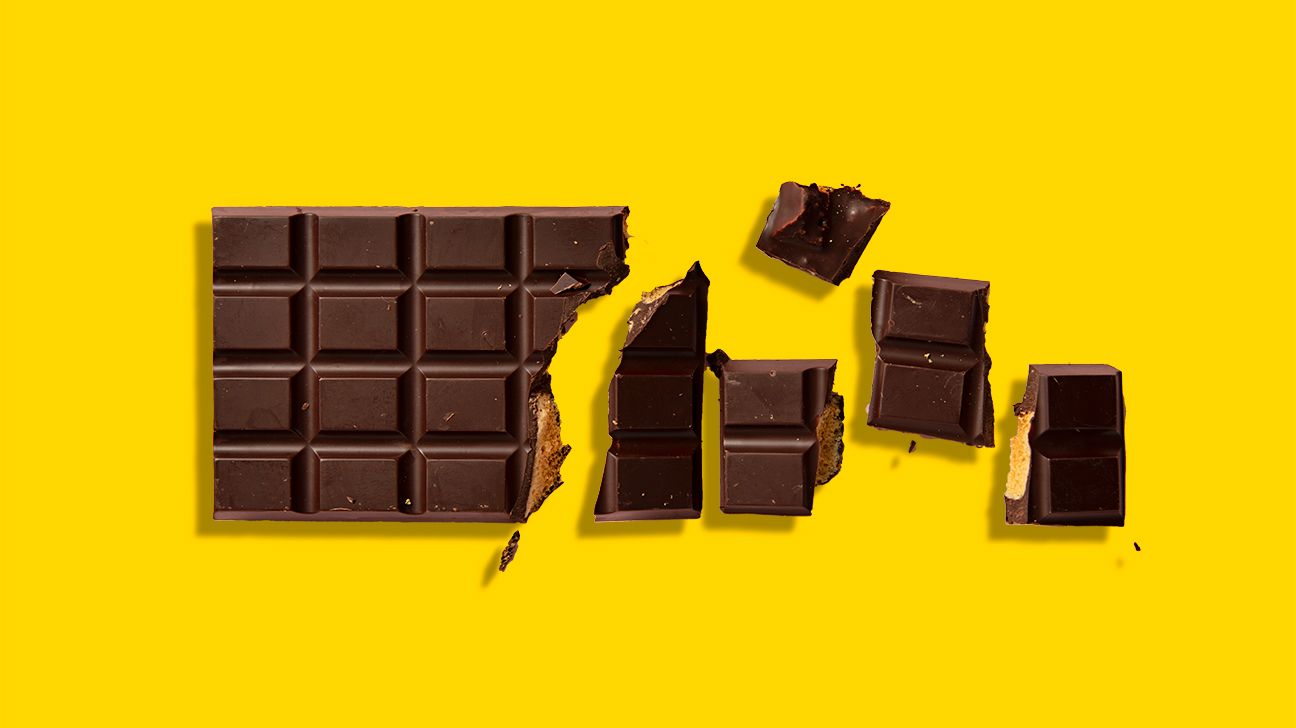If someone was dangling your significant other, your most prized candy bar, and a cup of your morning latte from the edge of a cliff, how long would it take for you to lunge for the coffee and the chocolate?
(You can tell your partner you’d’ve gone for them, but we both know you don’t always have time to go back to the barista to grab another brew. Don’t worry. It’s our secret.)
We know by now that chocolate has some pretty solid health benefits, as we like to keep reminding ourselves of those when we break into a snack during our third run-through of “The Notebook” that week. (Not sorry. Not even slightly.)
But we’ve also heard that the sweet stuff might provide a decent amount of caffeine.
So are we crushing our chances of a good night’s sleep by devouring chocolate right before bed? Really? Even though it’s the scene with the ducks and the rain and everything? Dammit, caffeine.
We did some snooping on your behalf to work out whether you can unpause “The Notebook” and keep eating your chocolate before going to sleep, or if you have to wait until the sun comes up again to find out what happens.
(We know you’ve already seen it. This week. Twice.)
The simple answer: Probably not. But the more complex answer: Yes, chocolate does contain caffeine in varying amounts. However, caffeine might not need to shoulder the blame for your post-chocolate sleep disturbances all by itself.
On average, people consume amount about 110 to 260 milligrams of caffeine every day. The majority (70 to 90 percent) of caffeine people consume comes from coffee and tea, with the remainder coming from other sources like food.
But don’t go scarfing it down at bedtime, thinking you’re in the clear. Some of us may be more sensitive to caffeine than others (especially those who don’t drink coffee, soda, or tea on a regular basis).
These folks may experience pretty extreme alertness after consuming caffeine. It’s the adult version of wolfing down an entire pixie stick and setting out on a mission to dangle upside down from whatever you can find.
(On that topic, we looked into whether chocolate is actually addictive.)
Plus, there may be another culprit lurking in chocolate that makes catching Zzz’s tougher.
New research points the finger at theobromine, a compound that also comes from the cacao beans. It has effects on the body that resemble those of the buzzy coffee compound, and chocolate contains more theobromine than it does caffeine.
Research has a long way to go in this area. But, when it comes to those sweet, brown chunks of joy, it’s safe to say caffeine has its partners in crime. We’re looking at you, theobromine, you gosh-heckin’ scoundrel.
If you want to play it safe, skip chocolate altogether when the sun goes down. Better still, try to keep chocolate-related activities to before 3 p.m. since caffeine can stay in your system for up to 6 hours.
Even better yet, eat chocolate before 3 p.m. but choose a healthier bar.
Let’s talk numbers. Exactly how much caffeine is in the chocolate that you’re eating? And, on top of your morning coffee and afternoon tea, are you getting too much caffeine?
There’s not necessarily a recommended daily intake for caffeine. However, researchers suggested that most healthy people are drinking ‘high levels of caffeine’ if they’re knocking back 400 milligrams or more per day.
People who are pregnant will have a much lower tolerance for caffeine, so the recommended intake shouldn’t be higher than 200 milligrams per day (although some think 300 milligrams is fine during pregnancy).
For now, use the following as a guide to help lay the foundation for the amount of caffeine found in your favorite chocolate treats.
Keep in mind that a medium (480 grams) coffee contains 192 milligrams of caffeine.
Here’s what the caffeine servings look like in all your favourite chocolate delivery systems, according to the USDA Food Composition Database:
- Dark chocolate (70 to 85 percent cacao solids): 80 milligrams caffeine per 100 grams
- Cocoa powder: 230 milligrams caffeine per 100 grams (but you’d really only use a tablespoon, which provides 12.3 milligrams caffeine)
- Dark(ish) chocolate (45 to 59 percent cacao solids): 43 milligrams caffeine per 100 grams
- Chocolate cake with chocolate frosting: 6 milligrams caffeine per 100 grams
- Milk chocolate: 20 milligrams caffeine per 100 grams
- Chocolate pudding cup: 2 milligrams per 100 grams
- Chocolate chip cookie: 11 milligrams caffeine per 100 grams
- Chocolate ice cream: 3 milligrams caffeine per 100 grams
1 small container (3.5 fluid ounces) = 2 milligrams - Chocolate whole milk: 1 milligrams caffeine per 100 grams
- White chocolate: 0 milligrams caffeine
The darker the chocolate, the higher its caffeine content. Dark also may have more nutritional benefits than lighter chocolate — but it won’t prevent it from keeping you up at night.
Here’s how to make a damn good chocolate cake.
Chocolate has some caffeine, but very little compared to your average cup of coffee. It may have other chemicals that get in the way of sleep, but there’s a simple test: Eat some chocolate, and see how it makes you feel.
At the end of the day, you know your body best, so do what feels right for you. We don’t know how your body reacts to smaller doses of caffeine — you’ve never met us. (Although we’d love to, you seem great.)
If that means enjoying the occasional glass of milk and chocolate chip cookie as a dreamy, low-caffeine, OMG-how-did-they-fit-that-many-ducks-into-“The Notebook”-treat before bedtime, you do you.
Sleep difficulties are no picnic. For people who find passport control at the Land of Nod a little stringent, we’ve got you.
Now, tell us again just how many letters you sent, Mr. Gosling…


